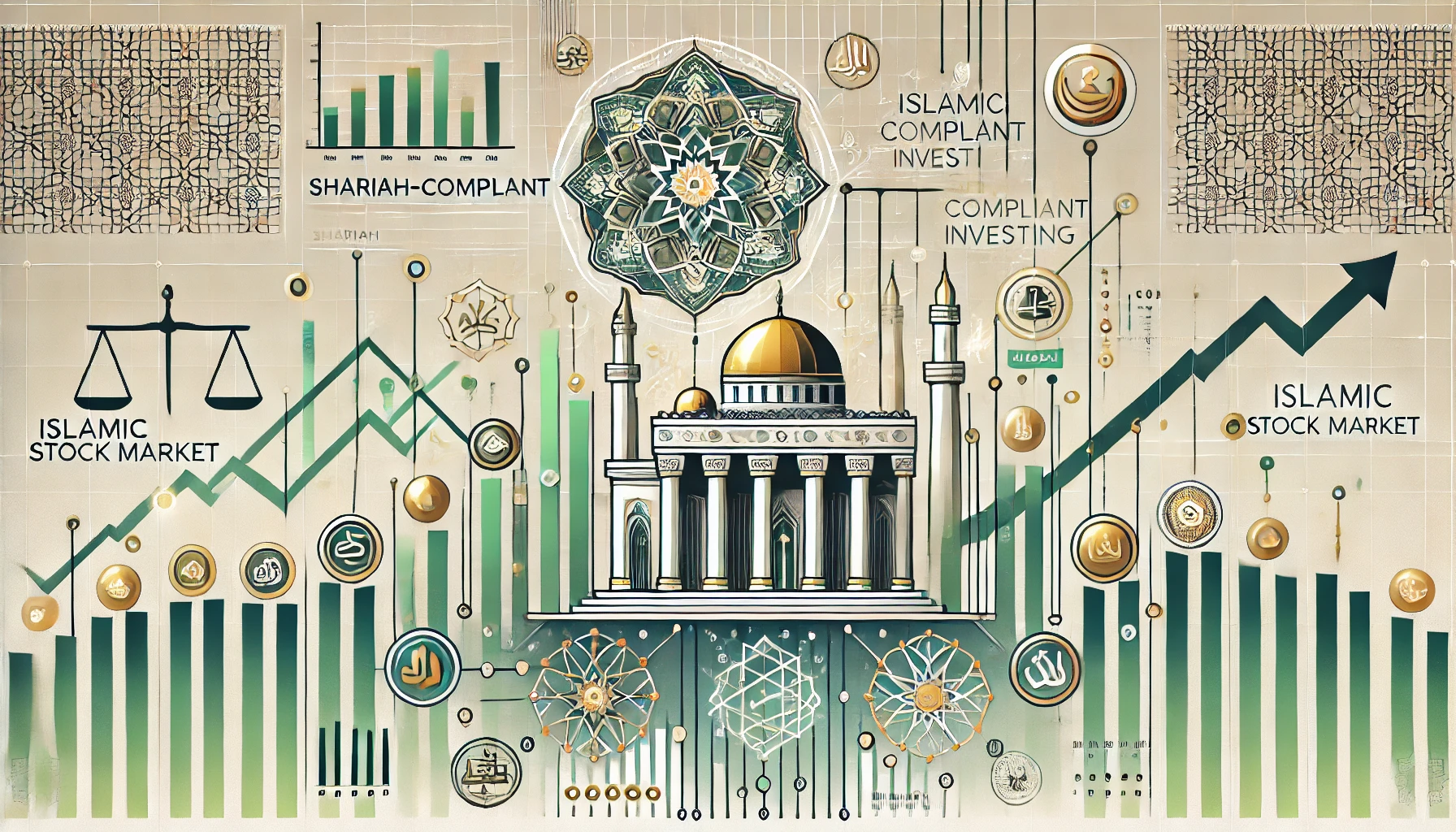Investing in the stock market is a great way to grow your wealth, but if you’re a Muslim, you might want to ensure your investments align with Sharia law and Halal Stocks.
This is where a halal stock portfolio comes into play.
A halal stock portfolio consists of investments in companies that meet the ethical and religious principles of Islam.
These investments are not only profitable but also ethically sound, as they avoid industries and activities prohibited by Sharia law.
In this article, we will explore everything you need to know about building a halal stock portfolio—from understanding Sharia-compliant stocks to selecting the best companies to include in your portfolio.
Whether you’re a seasoned investor or just starting, this guide will provide you with the knowledge and tools to make ethical investment decisions.
What Makes a Stock Halal?
A halal stock is essentially a share in a company that complies with Sharia law. But what does that mean exactly?
Let’s break it down.
1. Prohibited Activities Under Sharia Law
To determine if a stock is halal, it’s important to know what industries are prohibited under Sharia law. Some activities are strictly off-limits, including:
- Usury (Riba): Investing in companies that deal with interest-bearing loans is not allowed.
- Alcohol, Tobacco, and Gambling: Companies that produce, sell, or distribute alcohol, tobacco, or gambling-related products are considered non-compliant.
- Unethical Business Practices: Companies involved in fraudulent or unethical practices are also excluded from halal investing.
2. The Role of Islamic Finance in Halal Stocks
Islamic finance promotes ethical investing based on the principles of fairness, transparency, and social responsibility.
By following these principles, Sharia-compliant stocks not only align with religious beliefs but also support businesses that operate ethically, focusing on sustainable and responsible growth.
3. Screening Process for Halal Stocks
To find Sharia-compliant stocks, you can use various halal stock screeners.
These tools filter out companies involved in prohibited activities, ensuring that your investment choices adhere to Islamic values.

Read Too : Halal Stocks vs Conventional Stocks: What Makes Them a Better Choice?
Steps to Build a Halal Stock Portfolio
Building a halal stock portfolio involves careful planning and consideration.
Here’s a step-by-step guide on how to get started:
1. Assess Your Investment Goals
Before investing, take some time to assess your financial goals.
Are you looking for long-term growth, short-term gains, or a mix of both?
Understanding your investment goals will help you select the right halal stocks for your portfolio.
- Long-Term Goals: For long-term wealth accumulation, focus on industries that promote sustainable growth, such as technology, healthcare, and renewable energy.
- Short-Term Goals: If you’re looking for short-term gains, consider investing in Sharia-compliant stocks with high liquidity and market potential.
2. Diversify Your Portfolio
As with any portfolio, diversification is key to managing risk.
By investing in a variety of Sharia-compliant stocks across different industries, you can reduce the impact of any single investment’s poor performance.
- Industry Diversification: Include stocks from sectors like technology, finance, renewable energy, and consumer goods to spread your risk.
- Geographical Diversification: Consider investing in both local and international Islamic stocks to tap into different markets.
3. Understand Risk and Return
Like any investment, Sharia-compliant stocks come with their own set of risks and rewards.
It’s important to understand the potential risks involved in your chosen investments.
- Volatility: Some sectors, such as technology, can be more volatile, meaning their stock prices may fluctuate more frequently.
- Returns: Historically, companies that operate in the ethical sectors of the market often see steady, long-term returns. However, these companies may not always produce immediate gains.
Read Too : Boost Your Wealth! The Best Halal Stocks to Watch in 2026
4. Regularly Monitor and Review Your Portfolio
It’s important to regularly review your halal stock portfolio to ensure that your investments are still in line with Sharia law and aligned with your financial goals.
- Quarterly or Annual Reviews: Schedule regular reviews to assess the performance of your stocks and make any necessary adjustments.
- Stay Updated on Market Changes: Keep an eye on market trends, especially for sectors like renewable energy, technology, and sustainable agriculture.
Best Halal Stocks to Consider for Your Portfolio in 2025
The market for Sharia-compliant stocks is growing, and in 2025, there are several strong options to consider.
Below are some of the top halal stocks that offer solid growth potential:
1. Saudi Aramco – A Leader in Sustainable Energy
Saudi Aramco is the world’s largest oil company, and it is increasingly shifting its focus toward sustainability and renewable energy sources.
This makes it an attractive option for investors looking to build a halal stock portfolio while considering ethical investments.
- Sector: Energy and Renewables
- Why Invest: Saudi Aramco’s transition to greener energy sources makes it a strong long-term investment aligned with Islamic principles.
2. Al Rajhi Bank – Islamic Banking Giant
Al Rajhi Bank is one of the largest Islamic banks in the world and a pioneer in Sharia-compliant financial services.
Investing in Al Rajhi Bank gives you exposure to the booming Islamic finance industry.
- Sector: Financial Services
- Why Invest: As a leader in Islamic banking, Al Rajhi Bank is a safe and ethical investment choice with a proven track record.
Read Too : Financial Success with Faith: Top Halal Stocks for Muslim Investors
3. Tesla – Green Halal Investment
Tesla has become a popular choice for ethical investors due to its commitment to sustainable energy.
Tesla’s focus on electric vehicles (EVs) and renewable energy technologies aligns with Sharia law’s emphasis on environmental sustainability.
- Sector: Technology and Clean Energy
- Why Invest: Tesla is a forward-thinking company with a focus on environmental sustainability, making it an attractive halal investment option.
4. Sime Darby Plantation – Ethical Agriculture
Sime Darby Plantation is a leading palm oil producer that emphasizes sustainability and ethical practices.
This makes it a solid choice for halal investors who want to support responsible agricultural companies.
- Sector: Agriculture
- Why Invest: The company’s commitment to ethical practices and sustainability makes it a good choice for those seeking a socially responsible investment.
Read Too : Why Halal Stocks Are the Future of Ethical Investing
Common Mistakes to Avoid When Building a Halal Stock Portfolio
Building a halal stock portfolio comes with its own set of challenges.
Here are some common mistakes to avoid:
1. Not Properly Screening Stocks
Failing to thoroughly screen stocks for Sharia compliance can lead to unintentional investments in companies that do not adhere to Islamic finance principles.
Always use reliable screening tools and ensure each stock is properly vetted.
2. Overconcentration in One Sector
Investing too heavily in one sector can increase risk.
Diversify your investments across different industries to reduce the impact of market fluctuations.
3. Ignoring Long-Term Sustainability
While short-term gains can be tempting, focusing only on immediate returns may lead to risky investments.
Opt for companies that prioritize long-term, sustainable growth to align with Sharia law’s principles of fairness and social responsibility.
Read Too : Top Halal Stocks for Profitable and Ethical Portfolios
Conclusion
Building a halal stock portfolio is an excellent way to grow your wealth while adhering to your moral and religious values.
By following the steps outlined in this article, you can select Sharia-compliant stocks that align with Islamic finance principles, diversify your investments, and build a balanced portfolio.
As you move forward with your investments, remember to stay informed, be patient, and focus on companies that prioritize ethical practices and long-term sustainability.
In 2025, the market is ripe with opportunities for halal investors, and with the right approach, you can build a portfolio that not only supports your financial goals but also aligns with your values.
Read Too : Top Halal Stocks to Invest in for Ethical Returns
FAQ
1. What are halal stocks?
Halal stocks are shares in companies that adhere to Sharia law, avoiding involvement in prohibited activities like usury (riba), alcohol, gambling, and unethical business practices.
2. How do I know if a stock is Sharia-compliant?
You can use Sharia-compliant stock screeners to filter out companies that do not meet Islamic finance principles.
These tools assess whether a company’s operations align with Sharia law.
3. What are the benefits of building a halal stock portfolio?
Building a halal stock portfolio allows you to invest in a socially responsible, ethical manner while ensuring your investments comply with Islamic finance principles.
4. Can I invest in Tesla and still follow Sharia law?
Yes, Tesla is considered Sharia-compliant due to its focus on clean energy and sustainability, which align with Islamic finance principles.
5. How do I diversify my halal stock portfolio?
Diversify by investing in a variety of sectors, such as technology, finance, renewable energy, and agriculture.
This reduces risk and ensures your investments are balanced and ethical.




